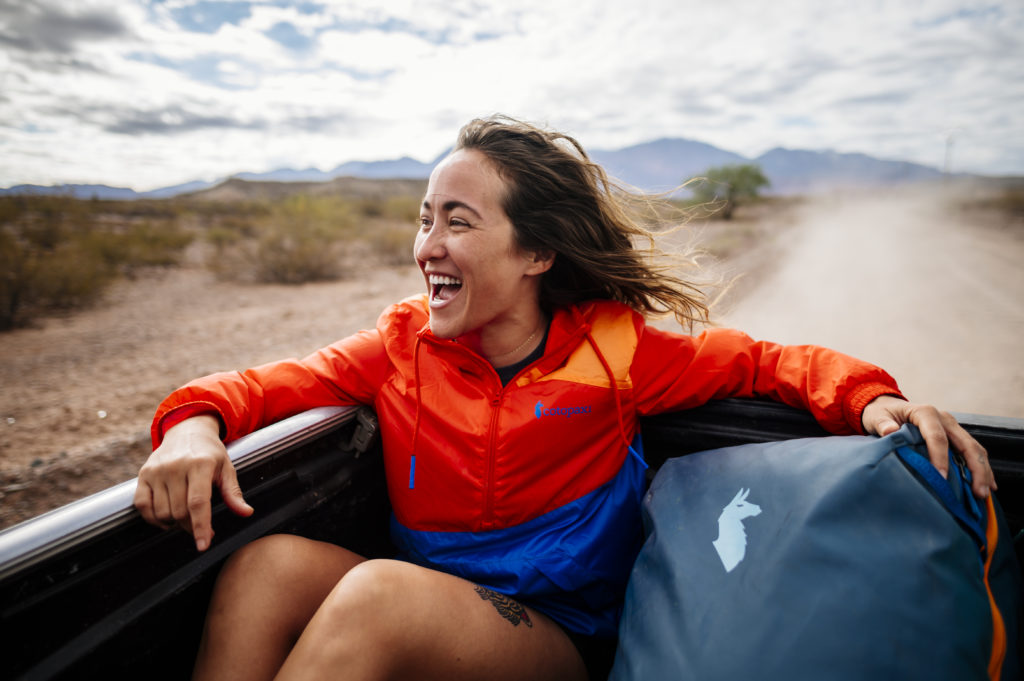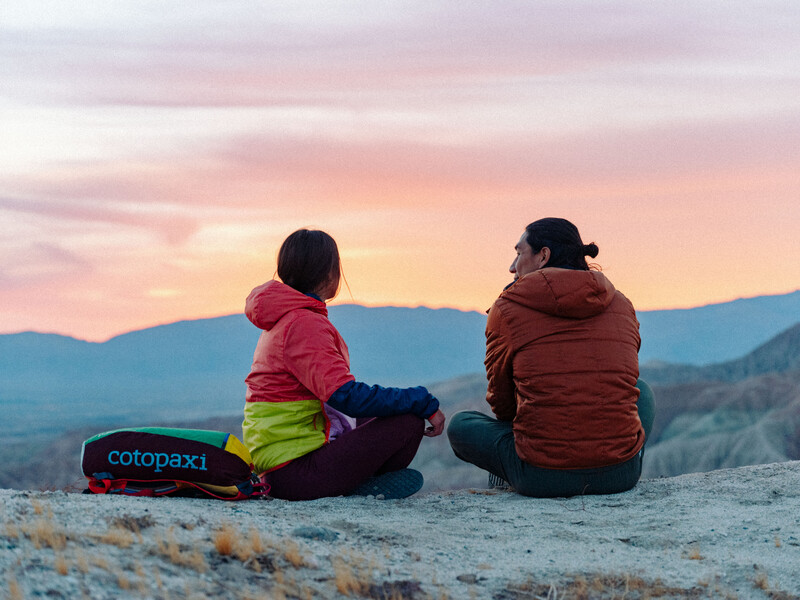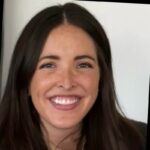Davis Smith is the Pacific U.S. regional honoree for the 2022 YPO Global Impact Award. The award focuses on YPO members making impact outside the organization that is both sustainable and scalable, affecting people, prosperity, peace or our planet.
Davis Smith received solid advice from some business school classmates during his days at Wharton: You only get one chance to launch.
Those classmates eventually founded American eyewear retail brand Warby Parker, a USD521 million business, so they knew what they were talking about. Smith listened, and in 2014, when he launched his eye-catching, innovative outdoor gear brand Cotopaxi, he went big.
He parlayed social media strategy and a cross-country college campus tour of the U.S. — with two full-grown llamas in tow — to promote The Questival, a one-of-a-kind experience that introduced would-be customers to his new brand. Questival participants received a Cotopaxi backpack and earned prizes by tackling challenges that aligned with Cotopaxi’s ethos including outdoor adventures and community service projects.
— Davis Smith, Pacific U.S. regional honoree for the 2022 YPO Global Impact Award share
“This young generation shares a lot of our values. They care deeply about looking out for the vulnerable among us and in the responsibility that businesses have to their communities,” Smith says. “Trying to convince them to just go buy more stuff was not going to work. If we wanted them to care about our brand, we needed to create an experience that allowed them to go live these values that we mutually cared about.”
Their customers got it. “The day of our launch, we saw teams wearing Cotopaxi shirts and hats. But we didn’t make shirts or hats. We’d only made five backpacks at the time. So, they had made their own homemade Cotopaxi gear,” he remembers. “That’s when I realized there was something special about this brand we had created.”
Gear for good

The core of Cotopaxi’s mission is to sustainably fight poverty. They are a certified B Corp touting sustainable supply chain management principles, climate neutral certified, and generously contribute revenues toward vetted grants targeting poverty to great impact. In 2021, the company helped more than 1.2 million people living in poverty — the first year they were able to break one million.
“That was a massive and emotional milestone,” Smith says. “It was realizing that we’ve built something making a difference in the world. And as we continue to grow and scale, that impact will only grow.”
Discovering a ‘how’
Smith’s worldview was shaped by exposure to both extreme poverty and the importance of giving back from an early age. When he was 4 years old, his father’s job as a contractor for the Church of Jesus Christ of Latter-day Saints brought their family from Salt Lake City, Utah, to locations throughout Latin America.
“I’ve really understood my ‘why’ since I was a child,” he says. “I knew I was not smarter or harder working or more ambitious than anyone around me. I was just lucky to have been born into a situation that provided me with opportunities others didn’t have. So, I’ve always felt a deep sense of duty and responsibility to find a way to use my life to help others. I didn’t know exactly how, but I knew the why.”
While attending Brigham Young University, Smith had a chance meeting with Steve Gibson, a successful entrepreneur whose philanthropic work had inspired him for years, and it nudged him onto his own entrepreneurial path. When Smith pitched himself as a great addition to Gibson’s nonprofit staff, Gibson had different advice for him: Become an entrepreneur and create his own impact.
— Davis Smith share
He started small, partnering with his cousin Kimball Thomas to launch pooltables.com, a direct-to-consumer company made possible by small loans from family and friends, including their grandmother. The company did USD1 million in its first year and by 2008, USD7 million.
Despite the quick success, both men still felt pulled to a greater purpose. Each enrolled in their dream business school, Smith at Wharton; Thomas at Harvard, and they sold pooltables.com to focus on their next big venture: baby.com.br, a baby product e-commerce platform that addressed the challenges of the supply chain in Brazil. After graduation, Smith moved with his wife and their two daughters to South America, a full-circle moment for him.
Baby.com.br saw rapid growth — Smith and Thomas raised USD40 million within the company’s first 18 months — but they also experienced growing pains and leadership conflicts. Smith eventually walked away from the business to forge a new path.
After sleepless nights wrestling with how he could best create a career helping others, the idea for Cotopaxi coalesced. Named after the volcano near his childhood home in Quito, Ecuador, this new idea, “Gear for Good,” had Smith energized, inspired and mapping out every detail from the sustainable business model to the marketing-friendly llama mascot and eventual Questival events.
“Even in the early stage you can think about purpose and mission and what you stand for. That’s something I hadn’t really done with my first businesses,” he says. “With Cotopaxi, I thought of all these things before we even sold a single item, I knew what we stood for. I knew what we represented.”
Leading with ‘why’

Confidence in what he wanted to create made it easy for Smith to pitch his idea to investors.
“We were asking them to believe in what we believed in, which was that doing good and doing well are not mutually exclusive,” he says. In meetings he would share his personal experiences, growing up among those in poverty, the people his company would now work to help. “They knew what they were getting. It wasn’t an afterthought of, ‘oh and by the way, we are also going to do good.”
Smith built Cotopaxi putting people first every step of the way, starting with the supply chain. The company only works with factories that provide fair wages and conditions. They source their materials from remnants of other outdoor gear so less finds its way into landfills. By 2025, all their products will be made using repurposed, recycled and responsible materials.
But perhaps the biggest way they have impact is through the Cotopaxi Foundation, the company’s investment arm, where they distribute a minimum of 1% of their revenue through multi-year grants (during the last two years they’ve given 2% and 3% of revenues, well above their committed 1%). The grants focus on health care, education and livelihood training in the poorest communities in the Americas, predominantly Latin America. These categories were identified by Massachusetts Institute of Technology’s Abdul Latif Jameel Poverty Action Lab (J-Pal) as areas with the highest potential for addressing systemic need. They also work closely with The International Rescue Committee (IRC) to support refugees in Salt Lake City, Seattle and Denver.
Smith’s vision attracted investors — predominantly female investors he’s quick to point out — but despite the capital raised, growth didn’t happen as quickly as he would have liked.
The biggest reason? The way they do business simply costs a little more. Working only with fair trade factories is more expensive, and in addition to that higher cost, Cotopaxi adds allotments for the workers to use toward something they need, from community gardens to computers and computer classes for them and their families. It hasn’t always been easy, there were times when Smith was unsure if he would be able to make payroll, but it’s all in service to a bigger mission: doing capitalism differently.
“I’m a big believer that business leaders have a responsibility to find a way to think differently about capitalism. What should it look like 100 years from now? How can we do it better? We try and think differently about how we make our products. How do we minimize our impact on the planet? How do we create a movement around business as a force for good where we’re using profits not to just enrich shareholders, but to focus on stakeholders — stakeholders being everyone that lives on this planet?”
Creating a community
Today, Smith leads 200 employees, and he’s proud of the community he and his team have built. Often when he’s traveling and donning Cotopaxi gear, fellow members of the Cotopaxi club come up to him and mention how much they appreciate the brand and its mission, not knowing that he’s the man behind the llama.
For Smith, it’s important that people understand that businesses can do good.
“You don’t need to be a nonprofit, but the purpose of your existence doesn’t solely have to be to make money. You can do both; find ways to touch people and pay people fairly while you create great returns for your investors.”
His advice to fellow business leaders: weave impact into everything you do. “Don’t look for something that just helps your business or potential customers,” he says. “Go help those who will never become customers, those you can never benefit from.”
Smith hopes Cotopaxi’s success serves as inspiration for other entrepreneurs.
“It’s less about Cotopaxi and more about proving this model works. We want to inspire a thousand other businesses to go out and make a difference,” he says. “Our brand can’t do it alone, but if we can get other leaders around the world looking for ways they can make a difference, we’ll change the world.”

